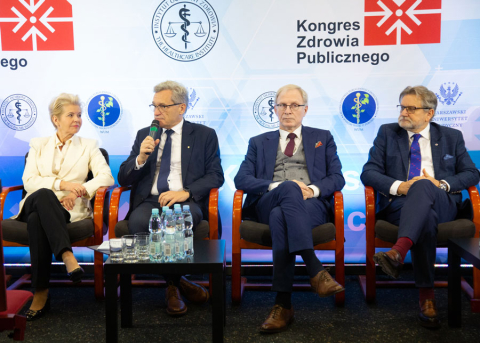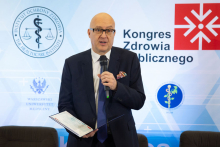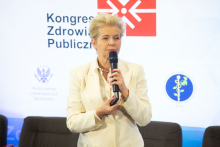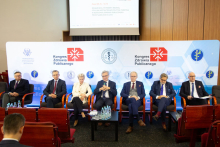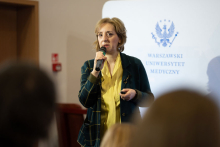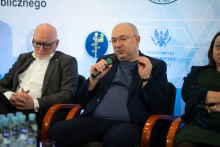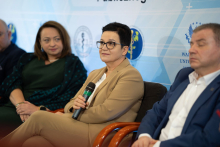The future of public health in Poland
Dr. Beata Małecka-Libera, chairwoman of the Senate Health Committee and special guest of the first day of the congress, spoke about what needs to be done. Dr. Małecka-Libera recalled an important moment for the shaping of public health system in Poland, which was the enactment of the Public Health Law in 2015 and the creation of the National Health Program. The challenges included in the law included demographics, care for the elderly, child and adolescent health, civilization diseases, environmental pollution, among others. Did it enable the creation of a good public health system? According to the speaker - no, and all the deficiencies were exposed by the coronavirus pandemic, and later - also by the war in Ukraine. According to the speaker, the situation was also not changed by the 2021 evaluation of the National Health Program, which not only failed to capture the new challenges facing public health in Poland, but also limited the sources of its funding.
- After almost 10 years of congresses, debates before the law and after the law: it's time to finally act - Dr. Małecka-Libera stressed.
The most important goals, according to the speaker, are a strong leader who will understand the topic and be able to unite the community in favor of healthiness, as well as the amendment of the Public Health Law and its financing.
Debate on state public health policy
The lecture was a prelude to the debates. The first one was led by the congress host Prof. Mariusz Gujski, Head of the Department of Public Health and Dean of the Faculty of Health Sciences MUW. The discussion was an attempt to answer the question of how to shape state policy in the field of public health for the next four years. It was attended by Prof. Zbigniew Gaciong, Rector of MUW, Dr. Tomasz Latos from the Law and Justice, Prof. Jarosław Pinkas, national consultant for public health, Dr. Marek Rutka of the Faculty of Management at the University of Gdańsk, Prof. Bolesław Samoliński, Head of the Department of Public and Environmental Health MUW, and Dr. Beata Małecka-Libera. They discussed education, prevention, and senior policy.
When asked to assess what is most important in the context of building the system, Prof. Zbigniew Gaciong spoke, among other things, about the education and preparation of medical staff. According to the Rector, we have an overproduction of medical faculties in Poland, and the first thing to do would be to reliably assess what the needs are and what cadres the state has at its disposal. Citing data from experts from the Polish Academy of Sciences, Prof. Gaciong stressed that what negatively distinguishes Poland from other EU countries is the concentration of physicians, as 28% of them work in the country's five large cities. Also working against the system is the lack of specialists in primary care.
- At present, what is most lacking in the system are those who will coordinate patient care at every level - Prof. Gaciong stressed - both at the basic level , which includes direct contact with the patient, and at the highest level - the control and functioning of the entire system in a way that ensures maximum efficiency.
In conclusion, the speakers identified their top priorities in this area.
- From my point of view - said Prof. Bolesław Samoliński - the most important element is to build a national strategy that would take into account all stages of life, that would be focused on health prevention and education, which would take into account the role of the patient in the system, which would destroy silos, and that would integrate all the activities of ministries that have an impact on public health.
Other experts stressed, among other things, the need for multifaceted health education, the creation of a nationwide prevention program for children, population-based control of risk factors, rationalization of health care spending, building a system of incentives or support in the fight against stimulants like alcohol and cigarettes.
A resilient and sustainable health system from the WHO perspective
This was the subject of a speech by a special guest on the second day of the congress: Dr. Nino Berdzuli, Director of the World Health Organization's Office in Poland, WHO's special envoy for activities for Ukrainian refugees in host countries. The speaker spoke about the polycrisis the EU is currently in (related, among other things, to the COVID-19 pandemic and the war in Ukraine) and the challenges facing the health care system. At the center of this crisis is a lack of trust in the health care system: on the part of citizens, health care system employees, and politicians.
- In such a situation, it is very difficult to convince anyone that it is necessary to invest in health - said Dr. Nino Berdzuli - Therefore, rebuilding trust is the basis for strengthening the health care system in all EU countries.
One of the challenges for the system is the crisis among health and care workers. The speaker spoke about the resolution adopted in late October, which proposes a series of measures to protect and support these workers. The actions are divided into five pillars that focus on strengthening education and training, skills as well as competencies; redefining teams and skill sets; and using digital solutions, among others.
Finally, Dr. Nino Berdzula emphasized one more important point about health:
– If we want resilient regions, we must have resilient people. It is therefore important to build health awareness and preventive measures. This is the simplest and cheapest way when it comes to public health interventions.
Other congress topics and discussants
The congress also discussed:
- National Transformation Plan for Health
- rare diseases
- Demographic and social changes in the context of mental health of Poles
- cooperation of medical professions for the health of Poles and the quality
- environmental hazards and diseases of civilization, including obesity and modern methods of its treatment
- innovations in public health and therapies
- and about harnessing the potential of public health graduates
Other participants in the discussions included: Maciej Miłkowski, Undersecretary of State at the Ministry of Health, Łukasz Jankowski, President of the Supreme Medical Council, Mariola Łodzinska, President of the Supreme Council of Nurses and Midwives, Elżbieta Piotrowska-Rutkowska, President of the Supreme Pharmaceutical Council, Renata Kaznowska, Deputy Mayor of the City of Warsaw, Professor Piotr GaŁecki, National Consultant in Psychiatry, Dr. Bernard Waśko, Director of the National Institute of Public Health PZH - National Research Institute and many others.
From MUW, in addition to those mentioned above, the participants included: Prof. Robert Gałązkowski, Vice Dean of the Faculty of Health Sciences, Head of the Department of Emergency Medical Sciences and Director of the Polish Medical Air Rescue, Prof. Leszek Czupryniak, Head of the Department of Diabetology and Internal Medicine, Prof. Artur Mamcarz, Head of the Department of Internal Medicine and Cardiology, Prof. Krzysztof Jamroziak, Vice Head of the Department of Hematology, Transplantology and Internal Medicine, Prof. Anna Kostera-Pruszczyk, Head of the Department of Neurology, Prof. Maciej Niewada, Chair and Department of Experimental and Clinical Pharmacology, Prof. Marcin Grabowski, Head of the 1st Chair and Department of Cardiology, Prof. Wojciech Lisik, Vice Rector for Clinical Affairs and Investments MUW, Department of General and Transplant Surgery MUW, Filip Raciborski, MD, PhD, Chairman of the program council of the Public Health field of study.
Scientific sessions were conducted during the congress. Scientists, students and doctoral students presented the results of their work and research in the field of public health. The 10th anniversary awards of the Public Health Congress were also presented.
Organizers and honorary patrons
The event took place on December 8 and 9 at the Teaching Center MUW, and was also broadcast online. It was organized by the Department of Public Health of the Faculty of Health Sciences MUW and the Institute of Health Care. The event was held under the patronage of the Rector of MUW, the Minister of Health, the Institute of Mother and Child, the Supreme Pharmacy Chamber, the Supreme Council of Nurses and Midwives, the University Clinical Center MUW and the President of the Social Insurance Institution.
